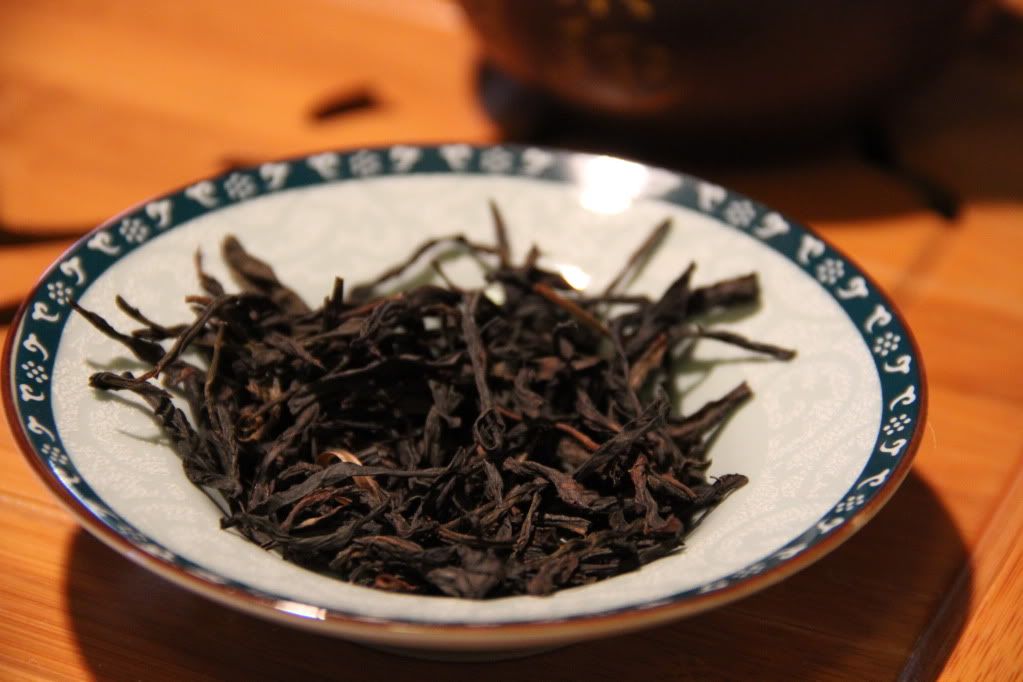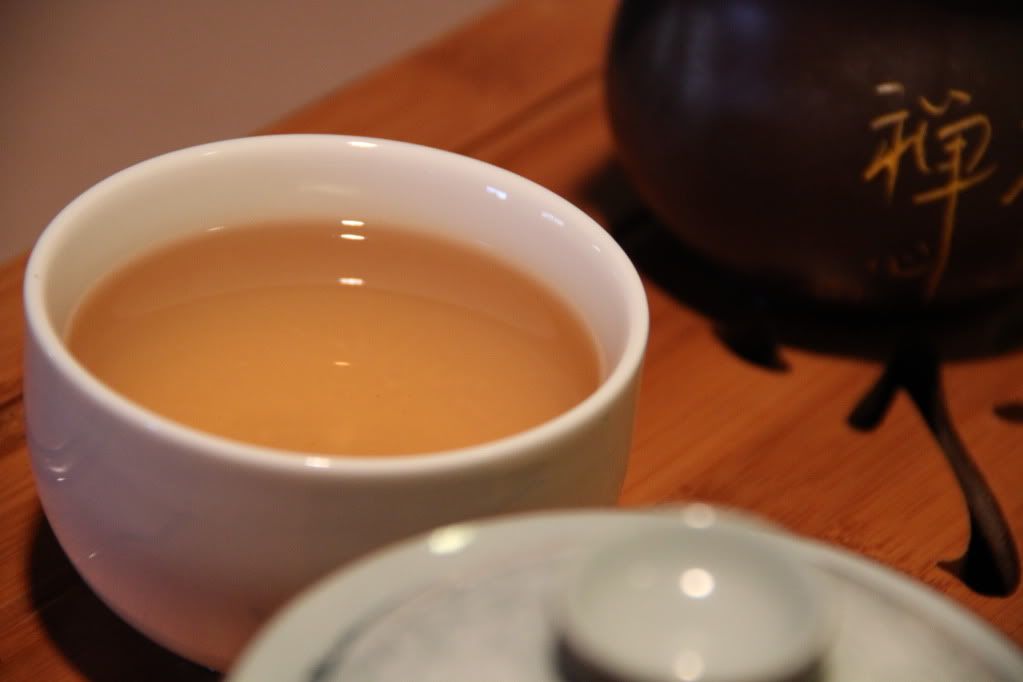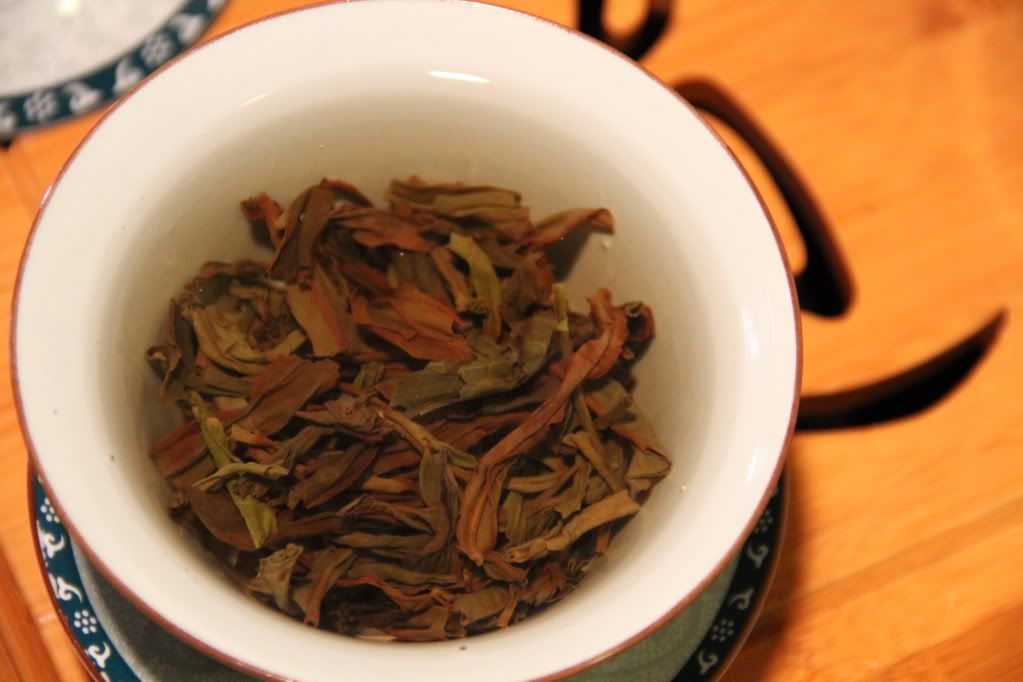Like all DanCongs, this tea is from the Guangdong province in China.
Usually these teas are named after a specific scent (honey orchid, osmanthus, etc..), but I am not sure what a "Yellow Stone" scent is.
The dry leaf has a powerful fruity aroma, displaying currents, lemon zest and strawberries, the latter being the most powerful. Usually DanCongs remind me of peaches and apricots, but this tea stands out from the rest, just like its name.
 In the dry leaf, strawberry is the most powerful scent.
In the dry leaf, strawberry is the most powerful scent.The liquor follows suit;
although in the liquor aroma, the strawberry aroma is intensified even greater.
It is so strong in fact, that I cannot pull out any other dimensions.
This tea is serious about its strawberries.
 Again, the rising star in the taste is the ever powerful strawberry, leaping forth as the victor of the most profound taste.
Again, the rising star in the taste is the ever powerful strawberry, leaping forth as the victor of the most profound taste.Honey, out of no where, becomes the runner-up. The sweetness of the tea is ever-present but not overwhelming, as I find to be the case in some other DanCongs.
Another difference in this phoenix is that the taste is dominated by fruity aspects and refuses to show any floral qualities.
A balancing astringency comes with each infusion of this tea, and after it has subsided, honey and wheat become the two lingering tastes.
 This is a wonderful tea, and as you can see from the infusing leaves, the quality is quite apparent. There are many different oxidation levels and I think that it is the blending of those differences that creates the unique characteristics of this tea.
This is a wonderful tea, and as you can see from the infusing leaves, the quality is quite apparent. There are many different oxidation levels and I think that it is the blending of those differences that creates the unique characteristics of this tea.Even though my descriptions may have made this sound like fairly complex tea, it really is not. The flavors are very up front and honest. I did not have to dig to hard to sense the qualities of this tea.
Once again, thank you to the fine folks at Bird Pick for this experience.








I like the name.
ReplyDeleteYellow is the colour for sacred/imperial and/or nourishing/royalty.
Phoenix is a feminine symbol of royalty like the Dragon but for woman power.
As for stone, consider it as a synonym for gem or precious stone.
I don't know if this makes sense but I can see a pattern here.
I find it fascinating that this tea has a strawberry aroma; I can believe it after encountering other dan cong, which, like you remark, very strongly resembles apricot or peach. I've also had dan cong which has its own, unique, and somewhat bizarre aroma which I can't easily describe.
ReplyDeleteIs all dan cong from Guangdong? Dan cong just means "single-trunk", referring to the growth pattern of the peculiar type of tea plant that this oolong is made from. Rishi Tea sells Dan cong from Hubei, the same province where they sell their "Hubei Keemun" from. In the case of Keemun, since Keemun is named after Qi men county, it makes sense to say it's "not real Keemun". Feng huang though means "phoenix mountain" so I think Rishi is pushing the envelope selling Hubei Dan Cong as "Feng huang dan cong". I haven't tried that tea, so I can't say anything about how good it is.
Ice,
ReplyDeleteMost chinese teas have very poetic names, it is just that it is not the norm for phoenix as far as I can tell.
I did not know what you have said and I appreciate you sharing your knowledge! Thank you!
Alex,
I have not seen any other dancongs of other origins besides guangdong. I suppose that it must also refer to the style of processing and, as you said, by the "single-trunk" aspect. I believe that the norm for teas labeled as dancong is a reference that it was grown on/in phoenix mountain and guangdong province. If every tea from guangdong had to be labeled "FengHuang DanCong Mi Lan Xiang" for example, it would be more confusing and maybe a bit too long of a name for an American market! Haha.
Thank you for your input!